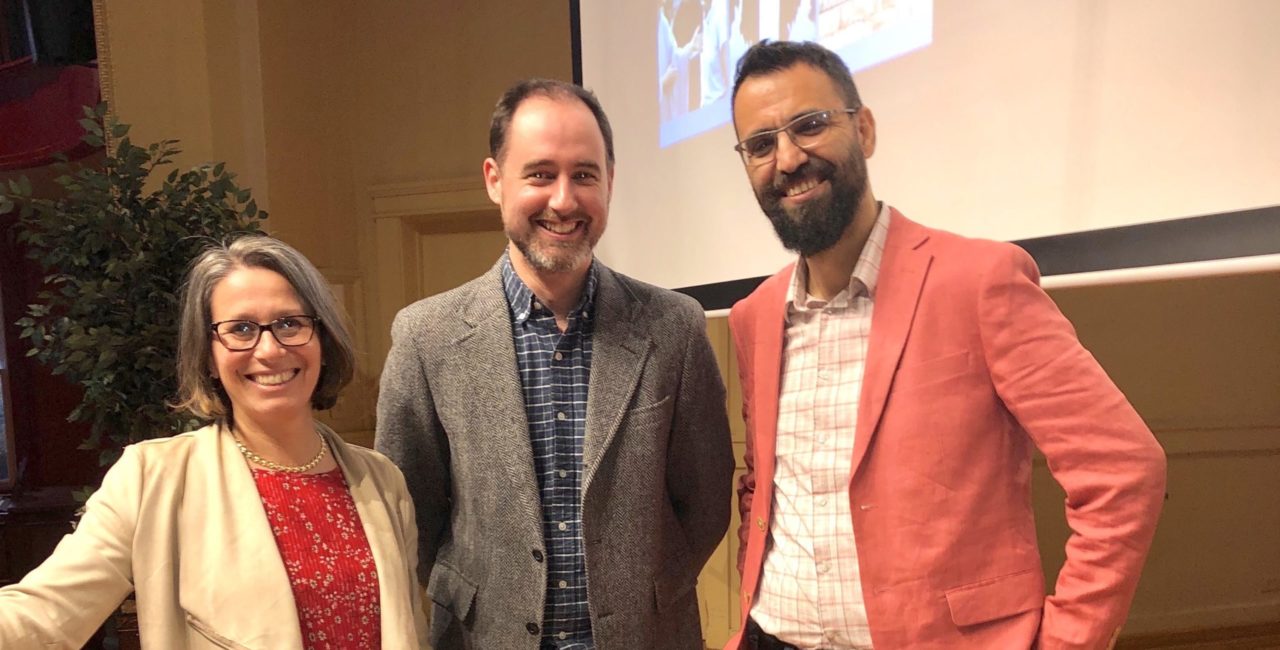
Moving from revenge to hope: Stukes lecturer tells his story
Peacemaker, entrepreneur, and author Aziz Abu Sarah spoke to students, faculty, and members of the community Feb. 20 about “Crossing Boundaries,” delivering the 33rd Annual Joseph T. Stukes Lecture at Erskine College.
Abu Sarah opened by recounting his selection as a National Geographic Explorer, explaining that when the organization first contacted him, he deleted the messages, believing they were phishing emails. When a representative from National Geographic finally phoned him with the news that he was actually slated to receive the Explorer designation, “I was surprised,” he said, “because I’m not an archaeologist or a conservationist.”
But as Abu Sarah now realizes, “Being an ‘explorer’ is not only about archaelogy or conservation—it is also about crossing boundaries,” which is what he has been doing during two decades of “exploring cultures, conflicts, and stories.”
Growing up as a Palestinian in Jerusalem, Abu Sarah saw conflict—and the actions taken to cope with that conflict—as normal. For example, when he set off for school each day, his family made sure he took with him a fresh onion, which, when held close to the nose, was thought to enable one to avoid passing out when teargassed.
Perhaps the most traumatic childhood event for Abu Sarah, the youngest of seven, was the arrest and imprisonment of his 18-year-old brother, Tayseer, the sibling closest to him in age. Incarcerated for nearly a year, Tayseer was released and admitted to the hospital for treatment of internal injuries. He died three weeks later at the age of 19.
The young Abu Sarah was angry and bitter. Revenge was the only option for him, he believed, and for the next eight years, revenge was all he cared about. Then, at the age of 18, he decided that even though he did not want to learn Hebrew, the language of the enemy, he needed to know Hebrew in order to make any progress in his education or career.
Having had little or no contact with Jews or Israelis, he enrolled in a school in Jerusalem, 15 minutes from where he grew up, where Jewish immigrants went to learn Hebrew. He was astounded when the teacher greeted him warmly—in Arabic. This was the beginning of a major shift for Abu Sarah, preparing him for the role of peacemaker, in which he has worked with bereaved Israeli and Palestinian families and fostered friendship in cultures divided by conflicts.
“We live behind walls of ignorance, fear, and hatred,” he told his audience. “We have to create cracks of hope and of relationship with each other.”
Abu Sarah’s commitment to building peace has taken him to more than 60 countries, including Afghanistan, Syria, and Colombia. He has served as executive director at the Center for World Religions, Diplomacy, and Conflict Resolution (CRDC) at George Mason University. His peacemaking journey inspired him to cofound MEJDI Tours, a company described on its website as “founded on the belief that tourism should be a vehicle for a more positive and interconnected world.”
He has written articles for a number of publications, including the New York Times, National Geographic, and the Washington Post. He is the recipient of numerous awards, among them the Goldberg Prize for Peace in the Middle East from the Institute of International Education, the European Parliament’s Silver Rose Award, and the Eisenhower Medallion.
Abu Sarah’s latest book, Crossing Boundaries: A Traveler’s Guide to World Peace, is set for publication in July.
In photo above, left to right, are Assistant Professor of History Dr. Alessandra Brivio, Assistant Professor of History Dr. John Harris, and Aziz Abu Sarah.
The Joseph T. Stukes Lecture Series brings a distinguished lecturer in history to Erskine College each year. The fund was established by students and colleagues of Stukes, who served as professor of history (1966-74) and vice president for academic affairs (1966-71) at Erskine College. He died in 2016.
